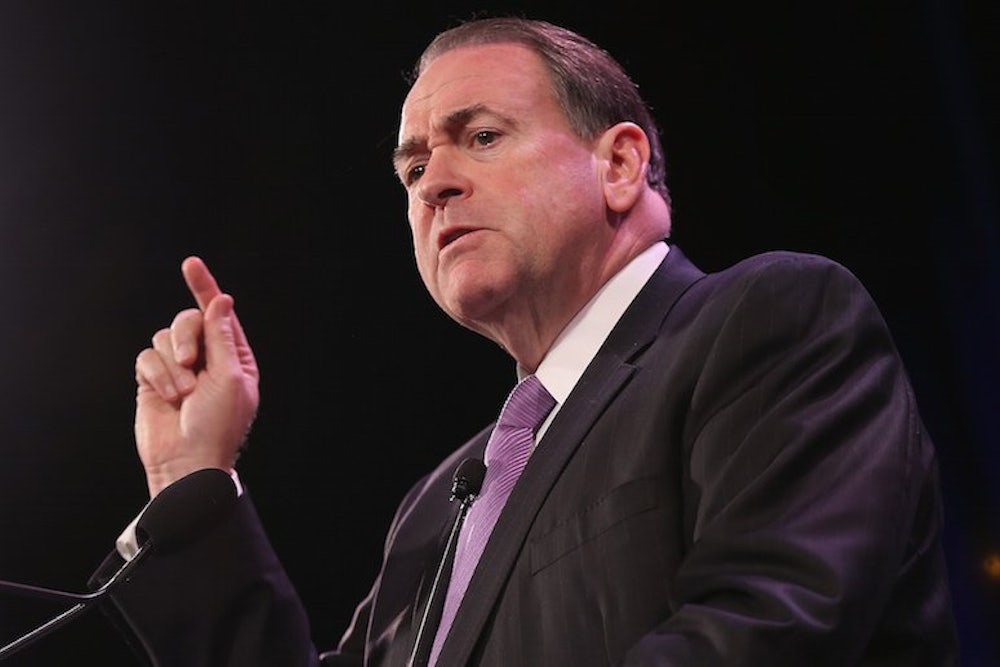On Tuesday Public Policy Polling released a survey measuring Republicans’ attitudes toward the upcoming presidential election. The survey assessed Republicans’ opinions of various candidates and political figures, along with their positions on a few policy issues. One of the more curious policy questions presented to respondents was whether or not Christianity should be established as America’s “national religion.”
A 57 percent majority of Republicans surveyed agreed that Christianity should, in fact, be established as the United States’ national religion. Broken down into different subsets, the numbers differed somewhat. Younger Republicans in the 18 – 45 age group were more favorable to the idea, with 63 percent of that cohort affirming that Christianity should be our national faith. Majorities of the older age groups still agreed, but in slightly smaller proportions. Among self-proclaimed Tea Partiers, 58 percent wished to establish Christianity as a state faith; and among those favoring former Arkansas Governor Mike Huckabee in the Republican primary, 94 percent would support such a measure. Eighty-three percent of Rick Perry fans replied that they would prefer Christianity be made our national religion, along with 62 percent of Rand Paul advocates.
Huckabee is the heir apparent to the political gravitas of the Christian Right, a Reagan-era bloc with dimly waning prospects. Huckabee, a former Southern Baptist pastor, was a staffer for televangelists in their 1980s heyday and still makes a show of palling around with former prosperity gospel shills like Jim Bakker. Like his suit-wearing, stage-sweating forbearers, Huckabee believes we need a “God-centered nation,” though it’s never exactly clear what that means: When he is pressed about whether or not he’s interested in a theocracy (that is, governance by religious officials) or theonomy (that Biblical law should serve in place of civil law), Huckabee always demurs. And yet his most ardent supporters seem to have received Huckabee’s message that America is in decline because we have collectively lost sight of the divine origins of our laws and customs, and have developed a preference for a rather obvious solution. If America at its most authentic and functional is, as Huckabee suggests, a Christian nation, why not establish Christianity as our national religion?
There are, of course, a slew of issues with establishing any state faith, chief among them the First Amendment. Naming state religion would also contravene all Republicans supposedly hold dear when it comes to maintaining a small unobtrusive government. But aside from the illegality and irrationality of it, naming Christianity the United States’ national faith would do damage to the faith and faithful even if it did somehow shore up national morality. This is because national faiths, for better or worse, tend to morph into nationalism with a faith element, rather than a faith that happens to be practiced by a particular nation.
This is already true of right wing rhetoric wherein Christianity is made to stand in for American conflicts or situations. Earlier this month, for example, President Barack Obama faced censorious outcry after noting that Christians of the past carried out the Crusades; with Republicans like Governor Bobby Jindal accusing the president of going hard on Christianity in lieu of ISIS, it’s clear the Crusades were, in this instance, turned into an analogy of a purely modern conflict, with Obama implied to be on the wrong side. By criticizing Christianity instead of Islam he was understood to take the side of foreigners rather than Americans.
With Christianity serving so often as a cheap byword for Americanism, it’s no surprise that 54 percent of Republicans believe the president is an undercover Muslim, and that a handful of their vocal politicians believe he does not love America. These are twin suspicions, both impossible to prove, both based on speculation about the president’s internal states, which trade evidence among them, such as the fact that Obama will not say that America is at war with Islam.
Were Christianity named our national religion, it would only be dubbed such to serve a particular national purpose, that is, to straighten out our morals or boost morale for our confrontation of terrorism abroad. But to do this would be to force Christianity into the servitude of particular national interests, which would only further the degree to which the Christian faith is already wrongly conflated with specific American political aims. But the goals of Christianity are in no sense specifically American, and understanding them as such only instills divisiveness between American and global Christianity—and that's ultimately contrary to the unity sought by the Christians of the world. In other words, establishing Christianity as a national faith would force Christianity into submission to American politics, morphing it into a servant rather than a guide of political thought.
There are many more problems than this: one wonders, for example, what the 94 percent of Huckabee lovers who would make Christianity our national faith would define as Christianity. Would this Christianity require sacraments, creeds, and adherence to tradition? Or would it profess the priesthood of all believers? Would we enact a broad-tent type of Christian requirement, where nothing more is expected of citizens other than some kind of public profession of faith, with their personal beliefs and practice left mostly up to them? In that case, establishing a national faith would amount to nothing more than enshrining in law how completely some view Christianity as a tool for American politics, rather than a faith of all nations and times.
